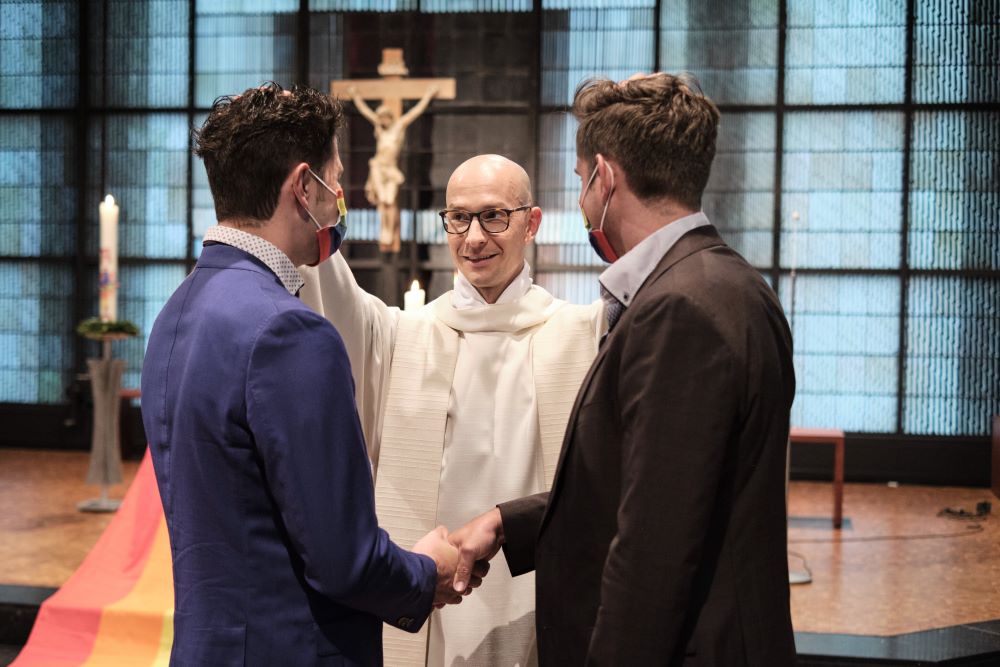
Fr. Christian Olding blesses a couple during a service called "Love Wins" in the Church of St. Martin in Geldern, Germany May 6, 2021. Pope Francis has approved a declaration that says a Catholic priest can bless a same-sex or other unmarried couple as long as it is not a formal liturgical blessing and does not suggest that the church is blessing the union as if it were a marriage. (OSV News/KNA/Rudolf Wichert)
The Vatican's recent declaration permitting some form of blessing for couples in same-sex relationships has inflamed the long-standing theological and cultural battles inside the Catholic Church.
The declaration might be somewhat confusing for people who have held onto the belief that same-sex relationships are themselves immoral and as such cannot be blessed by the church. For those people, the bestowal of blessings is seen as an affirmation. With the conclusion that same-sex relations are themselves immoral, the logical conclusion is thus to refuse the blessing of them by the church.
However, one must ask the following question: Is this the only way blessings can be understood? To address this question, one must pay close attention to the progressive approach embraced by Pope Francis.
In 2013, Francis was asked to comment on a priest said to be gay, and he responded with the now famous statement, "Who am I to judge?" After that, he announced the jubilee year of mercy and called on the church to embody mercy toward all, especially those who live at the margins of our world. He has dedicated his entire papacy to calling attention to the dynamic grace of God playing out at the peripheries of church and society. Even the ongoing synod on synodality is itself a turn to an understanding of grace that evokes an awakening toward surprise that transcends the logic of the familiar, especially theologies and canonical decrees that have been shaped by the familiar expressions of our understanding of tradition.
The Vatican's new declaration speaks to a richer understanding of grace, and how blessings can make grace real.
Francis' approach is an insistence on the dynamic nature of tradition. In this case, it is the church being invited to be open to those who have been otherized because they do not fit perfectly with the usual canonical and theological expectations.
The Vatican's new declaration speaks to a richer understanding of grace, and how blessings can make grace real. To seek God within the fellowship of Christ's body, the church never begins from a place of worthiness. It is first a reflection of a deep awareness of one's unworthiness before God and the desire to return to God, as did Zacchaeus in Luke's account of the Gospel.
What is even most telling in this process is that the mediative role of the fellowship of Christ, the church, is both a fellowship of the holy and of sinners. Their collective sanctity is derived from the source of their fellowship: Christ. It is only at the end of time that they will fully embody the sanctity that holds them together. This theological fact that defines the church's life tends to be forgotten by those who insist that there is only one way of being disposed toward the reception of divine grace through the ritual praxis of blessing. We see this play out in the eucharistic liturgy, where some priests feel obliged to announce before the reception of Communion that only those who are in the state of grace are to approach the altar of fellowship.
It is important we understand that, before God, no one is worthy, and no one is in the state of grace. Being in the state of grace is itself a gift and it calls for an openness to receiving that gift. It must begin with an interior turn to God, and a desire to want to encounter Christ within the church. This is captured in the following words in the Vatican document:
One who asks for a blessing show[s] himself to be in need of God's saving presence in his life and one who asks for a blessing from the Church recognizes the latter as a sacrament of the salvation that God offers. To seek a blessing in the Church is to acknowledge that the life of the Church springs from the womb of God's mercy and helps us to move forward, to live better, and to respond to the Lord's will.
Furthermore, our unworthiness is the pathway for the presence of God's grace in our lives. While the manifestation of sin can be seen visibly sometimes in the fruits of our actions or even in our hidden intentions, the enduring nature of grace in creation, and in this case, in our human lives, transcends what is visible.
Advertisement
The praxis of blessing same-sex couples, as advocated in this Vatican document, offers an openness to the enduring presence of grace that the blessings of the church attest to in our lives. In this case, the blessing is not about evidence of perfection. Rather, it is a statement of faith that God's enduring grace is still present, even in those situations that we may not fully comprehend. Faith evokes in us the conviction that through our fellowship in Christ, we will all bear the fruits of the Spirit in the world and toward each other. Thus, one can argue that blessing is itself a form of submission to the Holy Spirit, who can create a turn toward discernment for the harmony of our lives and a love of God's abundant life.
If the above is the case, one can conclude that blessing reflects the limits of ecclesial logic, while offering an opening for the response of the church to God's deep desire to encounter all of us personally. When Francis decrees that the blessing of same-sex couples ought not to be confused with sacramental marriage, I am of the opinion that he is not saying that such relations cannot mediate salvation for same-sex couples. Rather, he is saying that there is a theological and sacramental openness to the Spirit to help the church reach a richer understanding of such relationships, and how those relationships mediate God's salvific life for those who embody them.
It is on this note that I conclude that we ought to welcome this openness of the church to same-sex couples as one that offers us the opportunity to embody a discerning spirit, while supporting those in such relationships to live fully their lives as children of God so that they can authentically experience abundant life. Whether heterosexual or same-sex relationships, no relationship can be healthy without the support of the community. In this case, the role of the church is fundamental for mediating pathways of life for same-sex couples. By supporting them, the church ritualizes its belief of oneness in Christ.
Finally, the document concludes with a pastoral summon, one that is at the heart of the new life and the new humanity we all embody in and through Christ: "that the role of the church is to impart blessings on the world, and to be a recipient of blessings itself." If God's generosity of grace can be received outside the church itself, then the church must also embody such reciprocal generosity. This means that the first move of the church must never be about judging others or those who seek to belong. Rather, it must be an openness that is grounded in saturated hospitality, just like a benevolent parent who welcomes all their children.







